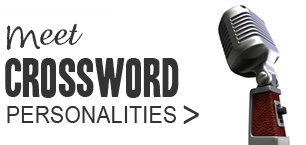| A guest post by Otterden aka Gordon Holt, who has been a crossword setter for the British weekly New Statesman magazine since 2004. The name 'Otterden' came from the fact that otters live in 'holts'! Before he turned to setting puzzles, Gordon Holt had a career in town planning and was the founder/editor of the profession's weekly newspaper. |

In deciding to include a long solution in a given puzzle a compiler is making a rod for his own back as clueing problems are far more likely to occur. It is possible that at the end of the day he or she will be forced to indulge in a complex series of wordplay devices in order to construct a satisfactory wordplay. In many cases succinct definitions of long solutions prove elusive. All of this may make the achievement of a clue with a fluent face reading difficult and may result in a clue that is awkward, tortuous and difficult to solve.
So, if there is an anagram available for the totality of the words in the solution all well and good. Unlikely maybe, but like most setters I always have a look for one at a very early stage in the clueing process. From my own experience by far the best result came when clueing one of my New Statesman puzzles. Here I had set myself the task of theming fictional characters who wore masks. Clearly, apart from Zorro, Batman etc., one of the solutions just had to be the 19 letter composite THE MAN IN THE IRON MASK. The chance of there being a total anagram for nineteen letters was slim but after I had a quick look at the multitudinous jumbles of words provided by electronic anagram finders, it dawned on me that buried here were the words I am the throne man’s kin which, joy oh joy, was also exactly the situation of the title character. So all I had to do was to add the ubiquitous 'perhaps' and I had an &Lit.
A particularly amazing cognate anagram of 23 letters is to be found in Michael Curl's Anagram Dictionary (this publication is unfortunately now out of print): A NOVEL BY A SCOTTISH WRITER leading to Ivanhoe by Sir Walter Scott.
No account is complete without mention of the celebrated 26-letter clue by Araucaria of The Guardian:
Poetical scene has surprisingly chaste Lord Archer vegetating (3, 3, 8, 12) THE OLD VICARAGE GRANTCHESTER
This may need some explaining to non-British solvers. The Old Vicarage, Grantchester is a poem by Rupert Brooke but later the home of Jeffery Archer, the British politician and author who at the time was keeping a low profile there after a sex scandal.
Of course, lengthy cognate anagrams of this sort are only going to be achievable once in a blue moon, but occasionally more conventional total anagrams are possible.
Some examples for readers to solve from past puzzles of mine:
Bones (knees and hips) are dislocated quite often on racehorses (9,8)
Was relieved to be off seeking image to change (5,2,8)
Brothers were aggrandising hero, perhaps (6,3,3,8)
---
In a further posting Otterden will discuss how, and how not to, clue long words with clueing devices other than anagrams. [Update (10th November 2013): Otterden's follow-up post – Clueing really long solutions in a crossword]
Related Posts:
- Camouflaging Anagrams ~ Tony Chesterley
- Think Of A Letter ~ Anax
- Clever charades for phrases in the grid
If you wish to keep track of further articles on Crossword Unclued, you can subscribe to it in a reader via RSS Feed. You can also subscribe by email and have articles delivered to your inbox, or follow me on twitter to get notified of new links.








 Follow on Twitter
Follow on Twitter Join us on Facebook
Join us on Facebook Get RSS
Get RSS

7 comments
Brothers were aggrandising hero, perhaps (6,3,3,8)
Ans : IRA AND GEORGE GRESHWIN(were aggrandising hero*)
1) Sheepskin Noseband
3) George and Ira Gershwin
Good answers, Lakshmi and Bhala.
Hint for the remaining clue: the answer starts with an 'S', ends with a 'G', and requires some knowledge of British history.
Ah, light dawneth.
SIEGE OF MAFEKING (MAFIKENG also works I believe)
I had the right fodder but was looking for a verbal ending in the past tense!
Well done Bhala. SIEGE OF MAFEKING is Otterden's expected solution.
In relation to a couple of the clues above, one of them your own, what is it about "perhaps" that indicates the rearranging of the letters, any more than, say, reversing them or deleting every second one?
Thanks in advance,
Steve = : ^ )
Hi Steve,
Thanks for raising the interesting question about "perhaps" as anagrind.
Gordon Holt says:
"I agree with Steve Ball that on the face of it 'perhaps' does not strictly tell a solver that the components of given words are to be rearranged or take a different state. However, 'perhaps' is widely used in UK crosswords as an anagram indicator and publications such as Chambers Crossword Dictionary give it some authority. My view is that while the word is indeed on the outer periphery of reasonableness as an indicator, I will use it, and its fellows 'maybe' and 'possibly', because most solvers will readily recognise these words as signalling that there is an anagram to solve. Therefore, their use cannot reasonably be labelled unfair. From a lazy setter’s point of view the use of 'perhaps' is of great help to fluent clueing as it can often be painlessly tacked on the beginning or end of a clue without disturbing face reading!"
- Shuchi
Post a Comment